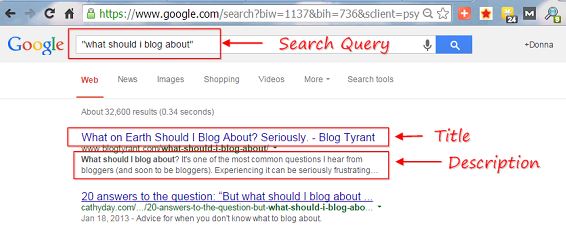Estimated Read Time: 10 Minutes
Blogging is a Frequent SEO Recommendation
SEOs often recommend business owners blog. They do so for a number of reasons, not least of which is pure numbers – the more content you produce, the greater your chances of showing up in search results. If you write a new post about blue widgets, you’ll now have a chance of ranking for search queries involving blue widgets. You might not rank highly, but before you wrote that post, you would not have ranked at all.
Finding Topics To Write About Is Hard
New bloggers – heck, seasoned bloggers – often struggle with finding topics to write about. With content marketing being touted as the new SEO and 91% of B2B and 86% of B2C businesses adopting the trend, there’s a virtual flood of information on the market. A Utah software company called Domo published an infographic in 2012 that shows just how much content gets published in a year. Domo estimated close to a billion new blog posts got posted in 2012 on just WordPress and Tumblr (a microblogging and social site owned by Yahoo)!
Those numbers are only increasing.
That means it’s increasingly hard to write unique content, stand out in a sea of competition, and resonate with your audience.
This post will help you get started. It won’t tell you exactly what to blog about, but it will provide a short list of topics and then some how-to information, tips, and tools to help you arrive at something more specific and custom to your business. The goal is to get you started, and then coax you along by pointing you to some additional helpful resources.
But first, it helps to have a high-level understanding of why and how people search.
Why and How People Search
People search for a reason. According to a 2011 survey conducted by about.com, 72% of people are searching the internet because they want to find solutions to problems or educational materials. The remaining 28% are window shoppers – they haven’t really decided what they’re looking for yet. They’re searching broad topics – surveying the market – looking for options, inspiration, distractions, or entertainment.
We want to attract the attention of the first group, the 72% who are searching for specific information that’s going to help them do what they need to get done. That group is more likely to stick with and appreciate your content – bookmark it, link to it, share it with others. Those things earn you exposure and help with your rankings.
People in the first group also tend to be in a hurry. They know what they want, and they want to find it quickly. So first and foremost, your content has to be easy to find on Google, the place where most people search.
When a query is submitted to Google, Google runs its ranking algorithm and rank orders results. Results are presented in descending order of relevance and popularity.
Searchers skim results; they don’t read them. 48-95% will glance at the top 10 and click on one of those. The rest hit the back button, refine their search, or view subsequent pages.
Results look similar to what you see below. A short title and description are displayed for each of up to 10 different search results. If you want to stand out, you have to create eye-catching, concise, and accurate titles and descriptions that draw your audience in and encourages them to click for more information.

Once you grab a searcher’s attention, you’ll need to write copy that’s going to satisfy their information wants and needs. If you can do that quickly, thoroughly, and in a way that builds trust and reputation, visitors will remember you, bookmark your content for future reference, and refer you to others.
Goals of Content Creation

Building trust with your audience should be a goal of content creation. You want to give people a chance to get to know you, the real you. Don’t just write the same old boring stuff that appears on a lot of sites.
- Write like you speak – conversationally.
- Offer your unguarded thoughts and opinions.
- Let your personality and quirks shine through.
- Be human.
Then, do good things on your blog; the same things you probably appreciate when others do them for you.
- Listen attentively.
- Be helpful – share your knowledge and expertise freely.
- Be responsive, polite, respectful, appreciative, open, candid, and honest.
- Differentiate facts from opinions.
- Give credit when credit is due.
- State your sources.
- Don’t overpromise.
- Follow-through on your commitments.
- Acknowledge when you’re wrong and apologize if you need to.
In effect, become worthy of their trust – earn their trust.
Characteristics of Successful Content

I don’t want to “give away the store”. I hear that fear all the time. Bloggers worried about saying too much, giving away their competitive advantage.
Obviously, there are proprietary things you should never disclose, but you have a lot of other useful information at your fingertips that could be very helpful to others – information you’d be at no risk of sharing.
You are unique, one of a kind in your combined knowledge, experience, and opinions. Site visitors want to tap into that. Give them the information they want and need and they will thank you for it. Mostly, remember if they wanted to do your job they wouldn’t be soliciting your expertise. They have a million other things they’d rather be doing.
The most memorable, bookmarked, shared and linked to content is the stuff that helps people get things done. It’s actionable – insightful, detailed, accurate, easy to follow and replicate without assistance.
When you help people do what they need to, they express appreciation by coming back for more and sharing your content with others. Sharing translates into increased exposure, website traffic and links which will eventually earn you higher traffic and rankings, especially if those links come from authoritative sources like universities, industry associations and government institutions. If you hold back, refrain from being helpful, you’ll have a hard time earning the traffic and rankings you’ll need to sustain an online business. Give valuable information away freely and you will be rewarded.
Now we get to the meat of the post – what are the topics you should consider writing about, the topics your audience cares about and will earn you traffic, links, trust, and exposure?
Suggested Starter Topics
Next is a short (28 item) list of topics grouped by your company, customers, and industry.
Your Company
Elaborate on your company history, products, and services. Give visitors a chance to get to know you: your mission, purpose, values, and priorities.
- “A Day In The Life” of Your Business
- “Behind The Scenes” Glimpses
- Charities / Causes You Support and Why
- Company History and Growth
- Competitions, Contests, and Give-Aways
- Staff and Leadership profiles
- White Papers
Your Customers
Provide insight into the depth and breadth of your existing experience with customers, markets, and industries. Give visitors a chance to draw parallels and gauge your ability to understand and appreciate their concerns and challenges. Show them examples of your work and experience so they can begin to weigh their options.
- Customer and User profiles
- Common Problems and Solutions
- Case Studies
- Makeovers / Before-And-Afters
- Frequently Asked Questions (FAQ) and Answers
Your Industry
Demonstrate your niche, expertise, and authority. Save visitors time, money, energy, and frustration by providing helpful information and insights into what they may or may not know already.
- Best Practices
- Cheat Sheets
- Checklists
- Critiques and Comparisons
- Curations / Lists
- Definitions
- Expert Opinions
- Glossaries
- How-Tos / Tutorials
- Insights and Observations
- Lessons Learned
- News and Press Releases
- Shortcuts, Tips, and Tricks
- Surveys and Reviews
- Useful Tools and Templates
- Worthwhile Workshops, Symposiums, and Events
The next section talks about ways to customize the topics for your business and audience.
Customize Topics For Your Business and Audience

Now that you have a starting point, it’s time to get specific. Translate the above list of suggested topics into something that’s going to be meaningful and actionable for your audience.
Start by focusing on existing prospects and customers. What questions do you and/or your staff get asked every day? What problems crop up time and again? What are the most common misconceptions, myths, and errors you can rectify?
Make a list. These are the things you should address first because it’s probably what first-time visitors are most interested in. Remember the survey referenced earlier? It concluded that 46% of site visitors are looking to find a quick solution to a problem or a little detail that’s been niggling at their brain for a while. Help them.
If you’re not clear on what those problems or niggling details might be, ask your customer service and sales staff. Ask your customers. Visit some of the more popular industry forums and question and answer sites. Skim and notice patterns in the questions. Use those to come up with another list of topics you can write about on your blog. If you know one or more people or a company that has already done a good job answering the questions, reference or share those posts along with an explanation as to why your audience might find them helpful. That’s how you build relationships with industry peers and bloggers while still satisfying your own audience.
Share Your Expertise

Once you’re done with that, move onto sharing your expertise. What tips, tricks, and cheat sheets do you have stored away in your head, in a drawer, on a laptop or an online bookmarking site that would make someone else’s life easier? I just talked about forums. What blogs, forums or news sites do you visit on a regular basis to find out what’s going on in your industry? What are the tools and reference materials you use on a day-to-day basis? This is all knowledge that you have accrued over time that could prove invaluable to your peers, prospects, and customers.
After that, visit industry blogs and social media sites to prompt even more ideas.
- Popular feed readers like Feedly, Newsblur, and Reeder help you collect and organize the latest publications of your preferred sources that you can view at your leisure.
- Social search sites like Topsy (for Twitter) and socialmention or Buzzsumo (for blogs, microblogs, bookmarking and news sites) let you search for topics that are currently getting a lot of online attention.
- Omgili (Oh My God I Love It) is a search engine for interesting and current discussions, news stories and blog posts.
- Alltop is a general-purpose breaking news and blog post curation site organized around specific topics.
- Groups on Facebook, LinkedIn, Google and other sites allow you to subscribe to content from like-minded members.
- You can set up custom alerts using tools like Trendspotter and Google Alerts.
- Google Analytics and Webmaster Tools will help you identify which of the posts you’ve already written are popular. Google Analytics can tell you the terms people are searching for within the confines of your own site.
Other Helpful Resources
We started by mentioning new bloggers often struggle with finding topics to write about. I want to leave you with some key takeaways:
- Involve front-line staff that really know what it is your audience wants and needs.
- Don’t be afraid to give away the store.
- Provide detailed, actionable information to visitors.
- If you don’t share it, someone else will.
I provided readers with a short list of 28 starter topics and suggested how the list might be narrowed down or expanded upon to be more specific and actionable for your audience.
If you’re still with me at this point and want more suggestions, I recommend my Blog Topic Ideas board on Pinterest. It has even more tips, tools, and suggestions. You can also do a Google search for “blog topic ideas” and see what comes up. That should be enough to get you started.
Have I missed any good ones? It’s impossible to inventory all of them. If you have suggestions you think would help others, please let me know in the comments below.







Leave A Comment